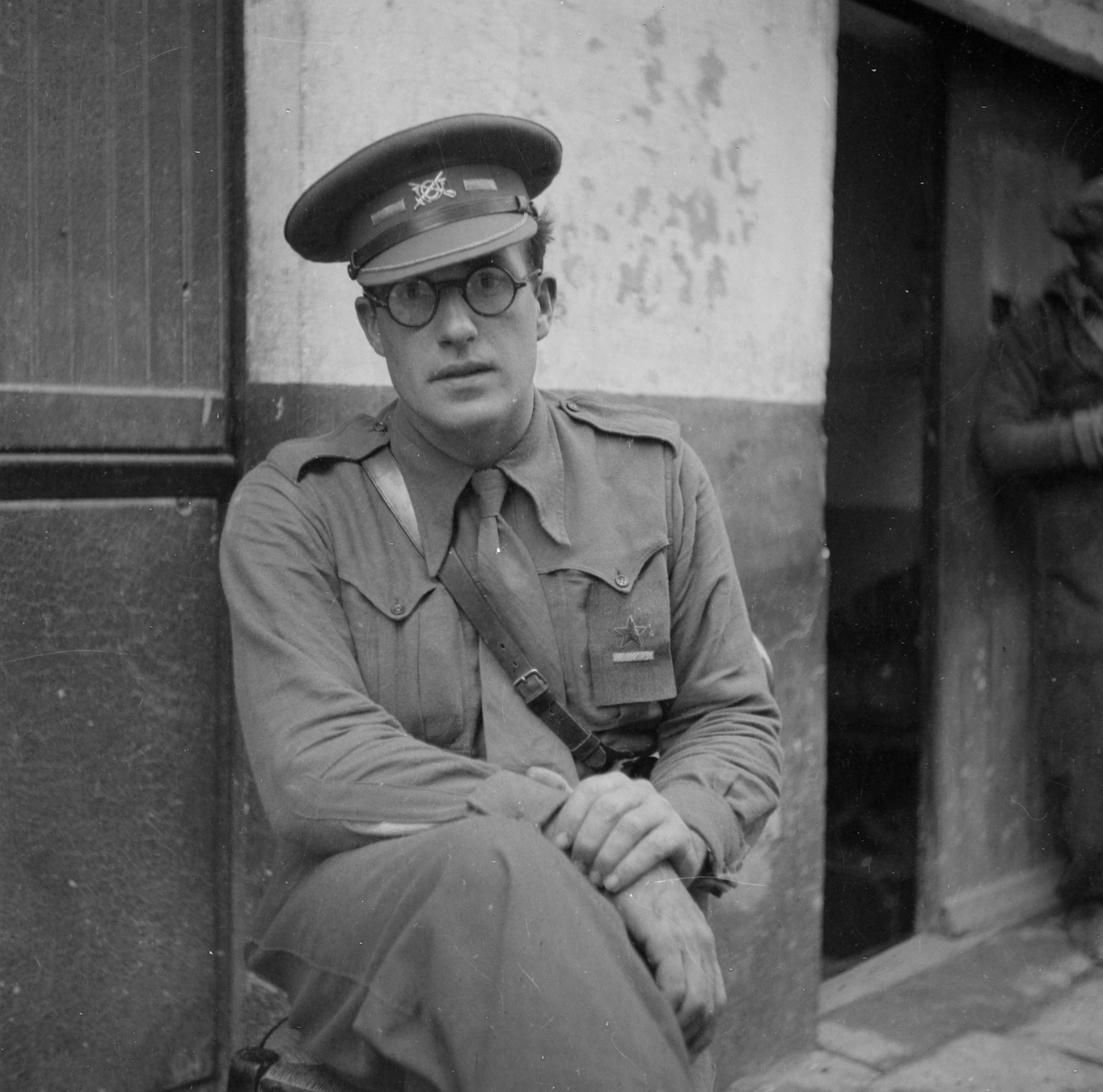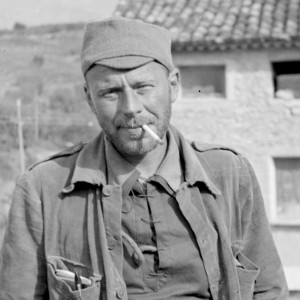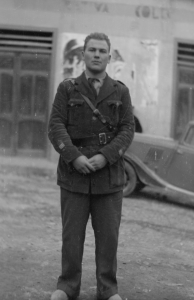The Death of Major Robert Hale Merriman
Robert Hale Merriman, Chief of Staff of the XV International Brigade, disappeared behind enemy lines. His body was never recovered. What happened? Two memoirs and an interview give conflicting versions.
Editor’s Note:
Robert Hale Merriman, Chief of Staff of the XV International Brigade, disappeared behind enemy lines in a desperate attempt to escape encirclement during the great Retreats in the early spring of 1938. His body was never recovered, which created an air of mystery as to what happened in his last campaign. Among the surviving Americans, a consensus emerged that suggested Merriman was killed outright or captured and executed later. Interviews with veterans who were in close proximity to Merriman concur that he was in command when the head of the retreating column departed a hill outside Gandesa on the evening of April 2, 1938. Leonard Lamb, John Rujevcic Gerlach (aka Ivan), Nick Pappas, and Milton Wolff were among those with Merriman just prior to his disappearance. During the movement, they remembered, Merriman’s group stumbled into a Nationalist encampment and in the dark and confusion of the engagement Merriman was either killed or captured.
In recent years memoirs by veterans Albin Ragner and Fausto Villar Esteban emerged to challenge the accepted version of the events leading to Merriman’s disappearance. Both of these veterans of the XV Brigade present their accounts authentically and sincerely despite writing their versions many years after the events they describe.
Recently, however, NYU’s Tamiment Library Director Timothy Johnson discovered a two-page manuscript, part of the newly-acquired Joseph North papers, that includes a contemporaneous interview with Lincoln veteran Fred Keller that reinforces the accuracy of the original accounts. To sort out these differences, ALBA turned to Christopher Brooks, a member of the ALBA Board and a U.S. Army veteran. The following analysis focuses on the key issues surrounding Merriman’s fate.
The XV Brigade was resting in positions around Belchite on the eve of the Nationalist Offensive known as The Retreats. The men were thawing out after the rigors of Teruel and Segura de los Baños and the officers and NCOs were integrating replacements. Beginning on March 9, 1938, The Nationalists pierced the Republican lines and shattered the XV Brigade in a series of running battles. After the defense of Caspe on March 17, 1938, the battered remnants of the XV Brigade were evacuated to an area outside Batea. There it was hastily rebuilt with the addition of replacements from the training camp; rear-area jobs; barely-healed men from the hospitals; and brand new Spanish conscripts. Alvah Bessie who joined the Lincoln-Washington Battalion on March 18 from a training camp was shocked to find that the battalion on his arrival consisted of a little more than 100 dejected survivors “disorganized, sitting, lying, sprawling on the ground. They had week-old beards; they were filthy and lousy.” On March 30, the battalion received new arms and munitions but time had already run out. The next morning the Nationalists resumed their offensive and approached the raw, untested and brittle XV Brigade.
This second phase of The Retreats proved an unmitigated disaster for the Republican Army. Rapidly moving Nationalist motorized columns punched through the Republican lines and penetrated deep into their rear. In a space of only three days the XV Brigade ceased to exist as a fighting force.
Cut off by the advance of Nationalist forces and cognizant that the British Battalion had already been destroyed, Merriman took charge of a mixture of elements, including the Brigade Staff, the Lincoln-Washington Battalion, and the XI International Brigade. Realizing the danger posed in being trapped behind the lines Merriman attempted to break out of the encirclement. He disengaged from the Nationalists and during the night of April 1, he force marched his command back to a hill just outside Gandesa.
The following morning Merriman attempted to break through Nationalist forces attacking Gandesa to reach Republican lines. The attack failed and survivors of the attack retreated to the hill and regrouped. During the remainder of the day, they faced down an enemy cavalry attack and hunkered down under desultory artillery fire. As dusk approached, the men formed into a column and at nightfall filed off the hill in the direction of Corbera and the Republican lines.
![Ivan Rujevcic [alias John Gerlach] (l.) and David Doran . Oct 1937 (Tamiment Library, NYU, 15th IB Photo Collection, Photo # 11-0756)](https://albavolunteer.org/wp-content/uploads/2016/02/Screen-Shot-2016-02-27-at-10.42.17-PM-298x300.png)
Ivan Rujevcic [alias John Gerlach] (l.) and David Doran . Oct 1937 (Tamiment Library, NYU, 15th IB Photo Collection, Photo # 11-0756)
Night movements are extremely difficult under the best of circumstances and Merriman was operating in less than optimal conditions. As the column moved, men soon lost contact with one another and the column fragmented into smaller elements. The lead company and the headquarters element lost contact with one another. John (Ivan) Gerlach led the headquarters element, consisting of about 30 men from the Brigade and Lincoln-Washington staffs, which became by default the head of the column. As their column moved along a cattle trail marked on their map, Gerlach realized that they had accidentally stumbled into a Nationalist encampment. Challenged by a sentry, the column scattered. Gerlach and Joe Brandt bolted straight ahead. Others retreated back in the direction from which they had traveled. It appears that Merriman and Dave Doran, the XV Brigade Commissar, unintentionally plunged deeper into the camp. Gerlach and Brandt stated they heard gun shots and the order in Spanish, “Manos arriba” (Hands Up). The consensus agrees that Merriman and Doran, the two highest ranking American officers in the XV Brigade were killed or captured at that time.
Albin Ragner, an Armenian American who served as a front-line rifleman in almost every battle the XV Brigade fought, recalled Merriman’s fate differently in a memoir written long after the war:
We were about eight or nine miles east of Gandesa during the retreat. We were on a high hill, good for defense. We had about 100 to 120 men here. We heard what sounded like tanks behind the hill to our front. I said to him [Merriman], “It sounds like enemy tanks ahead.” He said, “It can’t be, they must be ours.” He didn’t heed what I said and Merriman and two others went to the hill and over. He was captured there. Later the fascists executed him. (“Albin Ragner: An Unpublished Memoir” was published on ALBA’s The Volunteer blog February 27, 2013)
Ragner’s account placing the location eight or nine miles outside Gandesa indicates that Merriman was captured at least 24-hours prior to the timeline set in the consensus version. Because the memoir presents several inconsistencies, it is possible that Ragner assumed that Merriman was captured on April 1. If that were the case he would not have been available to plan and lead the breakout from Gandesa.
Fausto Villar Esteban, a Valencian conscript who served with the Lincoln-Washington Battalion from October 1937 until his capture on April 2, 1938, provided yet another account. In his unpublished memoir, Villar stated that Merriman was killed around 11 a.m. while leading the attack on Nationalist troops assaulting Gandesa on April 2. The attack was an attempt to punch a hole through Nationalist forces that would have allowed the remnants of the XV Brigade to cross back into Republican lines. Villar wrote that before the failed attack Merriman addressed the troops:
With a voice trembling with emotion, Merriman tells us all that, sad to say, the enemy has us surrounded, but that the Lincolns will break out of the noose, to which end we are to make a frontal assault on a single point, and that, as ever, he, Merriman will lead the Lincolns into this attack.
The Brigade moved down from the cover of the hill and began to cross a vineyard. As the troops entered open, flat terrain the Nationalists opened fire. Villar recalled with horror:
His machine-guns can mow down our Brigaders to their heart’s content; with no protection against this, the Brigaders are hitting the dirt.
There is panic.
We drop to the ground, seeking the only shelter we can find; the flattened furrows in the exposed vineyards, facing the enemy horizontally.
Laying prone under fire, Villar sought a way to escape but found that any movement “draws ferocious fire from the Francoist machine-guns.” While pinned down, he locates his former commander Lieutenant James Cody.
Above me, in a furrow higher up the slope, and a little forward of me, is Cody.
In the next furrow, higher still and forward of Cody, is Merriman; looking higher up, I find that there is no one else in sight. I have not laid eyes on Lamb since our retreat began and Doran I cannot see right now.
I call out to Cody, to tell him in my awful English, that we have to make our move: ‘Cody, it is necessary to move because, before or after, they will kill us off in this site.’
From Cody there is no response.
I call out to him again and again; ‘Cody, hear me. We need to move from here.’
I shout out repeatedly but he does not answer.
Cody is flat out like all the rest of us, but his face is twisted to the left, as if he is looking at Merriman, and so I call out to Merriman, once, twice, thrice, I don’t know how many times, but there is no response from Merriman either, in spite of my pleas for an answer. This time I address them both at once, in Spanish: ‘Por favor, contestarme!’ Then in my flawed English I plead with them: ‘Please, tell me something, Cody. Please, Merriman! Please!’
Reluctant though I am to credit it, by my reckoning their silence means that they are both dead; and the Battalion is facing horrific slaughter.
Beside myself with worry, I call out to them both again, but there is no response.
Anna Martí, in her article “In the footsteps of the Lincoln-Washington Battalion,” (published in the ALBA Blog on July 1, 2012), discussed Villar’s unpublished memoir. She concluded that the vagaries of time and memory “. . . may explain the many inconsistencies in his account” which was written almost 40 years after the events. Villar left the site of the action shortly after the failed attack and Nationalist cavalrymen captured him the following morning. Marti ends her observations with the question “Who says that Merriman could not have escaped from that situation and returned safely to the battalion?”
Fred Keller’s account, fresh in memory and documented in 1938, clearly affirms the accuracy of the original reports. His interview with Joe North refutes Ragnar’s version by establishing that Merriman was still alive and planned the attack on Nationalist forces at Gandesa during the morning of April 2. Villar’s account parallels Keller’s up to the point of the attack on Gandesa. Keller’s account refutes Villar and confirms that Merriman survived the failed attack and participated in the subsequent retreat during which Merriman disappeared.
Report of Freddie Keller Upon Action April 1 and 2
When we went into action Doran was in charge of one group, Copic of another. The English were demolished almost from the beginning when they walked into 12 whippet tanks. Two companies were gone, their leadership. The Mac-Paps saw no action on the first day. Our sector consisted of the Lincoln-Washington battalion, two of the XI, and one company of Mac-Paps. With fascist avions and artillery heavy, we had to retreat.
We on the other side were doing very good. Took prisoners, the fascists had heavy casualties. We were opposed by young troops. Then the Caseres sector gave way toward Gandesa. They cut us off and there was no way out. We were on the Batea road, about five kilometers to the left. About 4:30 p.m., April 1 we got the order to move. We and the XI were being reorganized. We were to take a place parallel to the Gandesa road, but before we got there the column broke. We abandoned material after breaking it up so it wouldn’t be any good any more.
We marched nine hours to the heights of Gandesa. The fascists were fighting to get into town. They were fighting the Listers. Merriman’s idea was that we attack them from the rear. His entire strategy was to break through the weakest spot in the fascist line, then fight them off. We went down anyway, had some casualties. There was some three, four hours of fighting. Just as we’re getting ready, the fascists pulled up with columns of motorized cars, some 40 tanks, plenty of artillery. We evacuated up a high hill, two kilometers from the town, up among the pines. Before evening fascist cavalry attacked. We fired on them with machineguns.
We started out in columns to head in the general direction for Corbera. We figured we could get there before the fascists. We came across [a] big danger spot in crossing the Villalba road. Not many of us got past before we were fired on. (Incidentally Honeycomb led a scouting party at that point and he ran away.) In crossing Villalba we broke up in small groups. Not many casualties. There was then a column of 650 men. Then we broke into small groups. Merriman, Doran, Ivan, Wolff, Lamb first section Machinegun Company. The whole Estado Mayor of the battalion and the brigade. That gang went on in the direction of Corbera. There we thought it was ours, but Corbera was in fascist hands already.
We came in through an olive orchard. They challenged us—we were fired on. Twenty-three of us then. We broke up. Merriman and Doran went to the left toward the highway. Wolfe [sic] called to me, and more of us went directly back; some went to the left. Group I was with went up on the mountain and stayed there till morning. In the morning I started down the highway and met a peasant breaking kegs of vino, good vino, because he didn’t want it to go to the fascists. He directed me to Asco. He said he had directed “muy grande[s] oficiales” that way earlier. All of them were wearing their insignia.
So I headed in the direction of Asco. That night I marched to La Fatarella. In the morning I hid from the fascist cavalry. Later I saw them attack Kaufman and some others. They obviously got them because the shots got less and less.
In the gang missing or killed were Doran, Merriman, Keith, Geiser (Orton was killed in the previous action two weeks ago at Caspe) Kauffman, Offsink, Blackie Maprellian, Bill Cody, Raymond Skistrom, Malin, Tapsell, Abe Sasson, Emery Redden, and Heininger of Pittsburgh.
There is this about it; whenever we fired, the infantry and cavalry of the fascists wouldn’t fight. They’d run. At Asco I talked to an old woman who told of many IBs executed in Asco. We went in small gangs till we got to the river. Between Asco and Flix we headed for the river, waiting there till dawn. The fascists were using bird whistles to call each other at night. The sun came up rapidly. We were caught. I swam with my rifle, pants and jacket. When I got on the other side I got rid of the heavy stuff. I came back down the river, some of our comrades needed help. I thought we could form a chain.
The fascists opened up with light air-cooled automatics, most of us running. Some got wounded. Plenty of guards up and down the river, alarmed. I ran down the railroad tracks when I got on the other side and ran into three fascist guards, who covered me and took me prisoner. Was brought to headquarters and held there five hours. Two officials of the thirty-fifth, Frenchmen, were also there. They captured some farmers in the town of Flix. The fascists were having a big celebration. That night, I and a Mac-Pap made our getaway. I socked a guard in the back of his neck while he wasn’t looking my way. He went flying. It got twilight while we were running. We came to a straight cliff. They couldn’t fire from that angle. I had no shoes – Cavalry came and searched. They went beyond me. I was there all night. When it was dawn I went on hands and knees to the river. I swam across safely. The other lad turned back when the fire opened. I went over. I haven’t seen him since.















